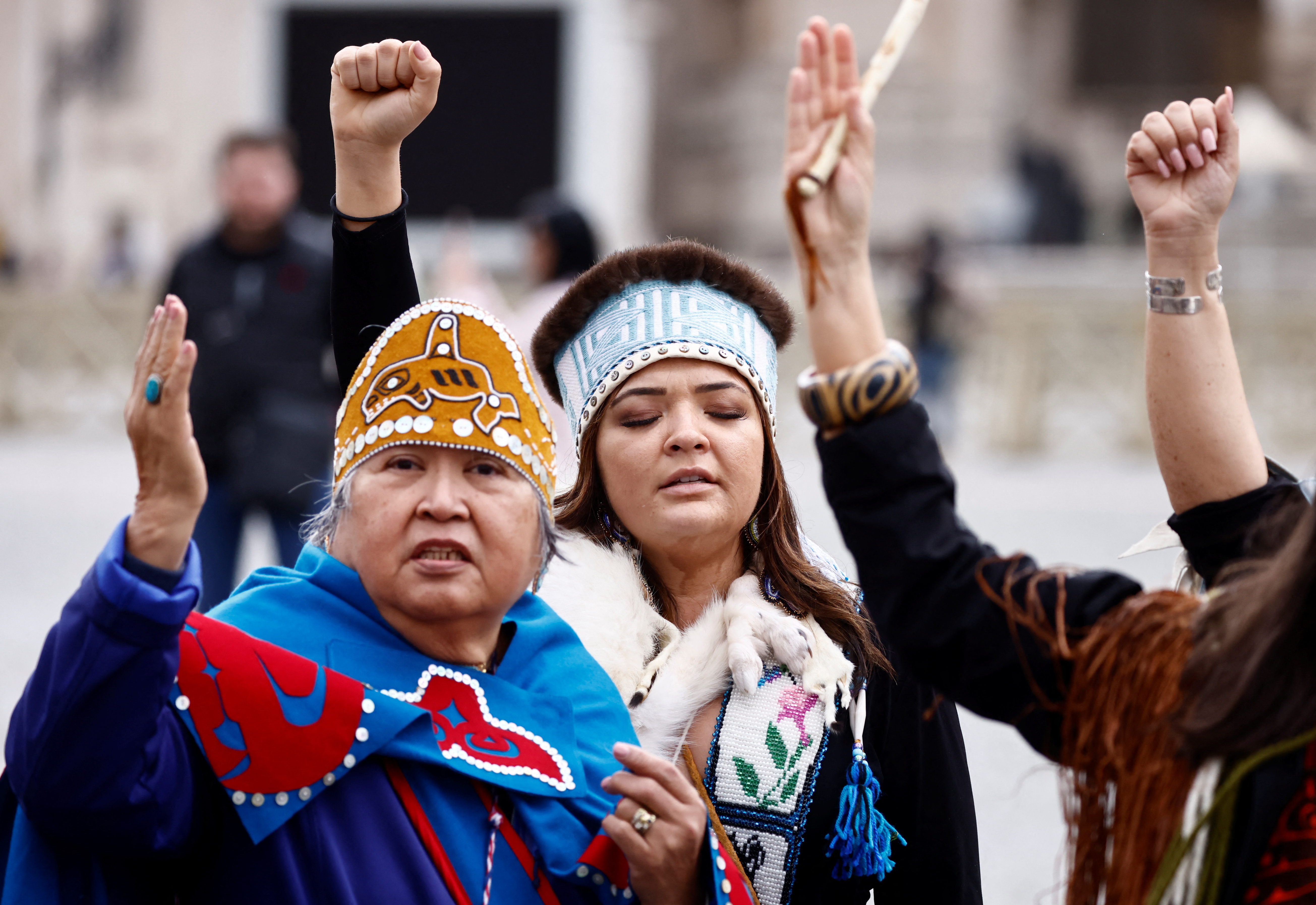
Warning: The story below contains details of residential schools that may be upsetting. Canada’s Indian Residential School Survivors and Family Crisis Line is available 24 hours a day at 1-866-925-4419.
Pope Francis has apologised for abuses that members of the Roman Catholic Church committed at Canada’s residential schools, which Indigenous children were forced to attend for decades and aimed to forcibly assimilate them into mainstream European culture.
Speaking to Indigenous delegates at the Vatican on Friday, Pope Francis said he felt “sorrow and shame” for the role Catholics played in the many harms that Indigenous children suffered while attending the schools.
“I feel sorrow and shame for the role that a number of Catholics, particularly those with educational responsibilities, have had in all these things that wounded you, the abuses you suffered and the lack of respect shown for your identity, your culture and even your spiritual values,” the pope said.
“For the deplorable conduct of these members of the Catholic Church, I ask for God’s forgiveness and I want to say to you with all my heart, I am very sorry. And I join my brothers, Canadian bishops, in asking your pardon.”
His comments come after a delegation of Indigenous leaders, residential school survivors and youth travelled to Rome, Italy this week to hold meetings with the pope and seek an apology for the church’s role in the system.
Canada forced more than 150,000 First Nations, Inuit, and Metis children to attend residential schools between the late 1800s and 1990s. The children were stripped of their languages and culture, separated from siblings, and subjected to psychological, physical and sexual abuse.
Thousands are believed to have died while attending the institutions, most of which were run by the Roman Catholic Church. A federal commission of inquiry into Canada’s residential schools, known as the Truth and Reconciliation Commission (TRC), concluded in 2015 that the system amounted to “cultural genocide”.
While other churches apologised for their role in residential schools, the Catholic Church had yet to offer such an apology – despite longstanding pleas from survivors, their families and communities.
Chief Gerald Antoine, head of the First Nations delegation in Rome, told reporters in the Italian capital that Pope Francis’s “long-overdue apology” was “a historical first step”.
“However [it is] only a first step,” Antoine said, explaining that to meet one of the TRC’s Calls to Action (PDF), the pope needs to deliver an apology in Canada. “The next step is for the Holy Father to apologise to our family at their home,” Antoine said.
That was echoed by Natan Obed, president of Inuit Tapiriit Kanatami, a group that represents more than 60,000 Inuit in Canada. “Today we have a piece of the puzzle,” Obed said during a news conference in Rome later in the day.
“We have a heartfelt expression from the church that was delivered by Pope Francis in an empathetic and caring way. I was touched by the way in which he expressed his sorrow, and also the way in which he condemned the actions of the church,” Obed said. “There is much more to do, and so an apology is a part of a larger picture.”
Visit to Canada
Pope Francis told the Indigenous delegates that he would travel to Canada. Canadian media reported that the visit is likely to happen in late July.
“The chain that passed on knowledge and ways of life and union with the land was broken by a colonisation that lacked respect for you, tore many of you from your vital milieu and tried to inform you to another mentality,” the pope said during his speech. “In this way, great harm was done to your identity and your culture and your families were separated.”
Canadian Prime Minister Justin Trudeau welcomed the papal apology as “a step forward”, saying that his government looked “forward to him [Pope Francis] coming to Canada to deliver that apology in person”.
“This apology would not have happened without the long advocacy of survivors who journeyed to tell their truths directly to the institution responsible and recounted and relived their painful memories,” Trudeau told reporters during a separate virtual news conference.
“It took a tremendous amount of bravery and determination. Today’s apology is a step forward in acknowledging the truth of our past in order to right historical wrongs, but there’s still work to be done.”
My heart and thoughts are with the many Inuit, First Nations and Métis. The long awaited apology from the Pope is important. I realize what this can stir and hope you rely on our elders for guidance as we continue to call on justice to be had.
— ᓘᕆ ᐃᓪᓚᐅᖅ Lori Idlout❄️ (@LoriIdlout) April 1, 2022
Indigenous leaders in Canada have called on the Catholic Church, as well as the federal government, to release all their records related to residential schools, as communities seek justice for the abuses that occurred. Many also have demanded financial reparations from the church.
Those calls for accountability have grown louder after unmarked graves were discovered at several former residential school sites across Canada since May of last year. Searches of former school grounds are ongoing.
“Pope Francis’ apology leaves us hopeful that there is more action on #reconciliation to come,” the Native Women’s Association of Canada also wrote on Twitter. “We hope this apology will signal more action in the future – including apologies on Canadian soil and the release of #ResidentialSchool records.”
“My heart and thoughts are with the many Inuit, First Nations and Metis,” Canadian parliament member Lori Idlout also tweeted. “The long awaited apology from the Pope is important. I realize what this can stir and hope you rely on our elders for guidance as we continue to call on justice to be had.”







